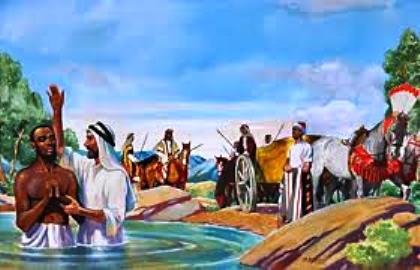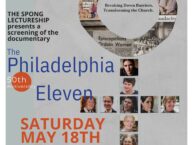 April 28, 2024: Alleluia, Christ is Risen! The Lord is risen indeed. Alleluia! Amen.
April 28, 2024: Alleluia, Christ is Risen! The Lord is risen indeed. Alleluia! Amen.
While it happens more often than we realize, how strange it is to hear two places in one of our scripture readings that feature so heavily in our news cycle today: Jerusalem and Gaza. Stranger still is what takes place.
In the reading from the Acts of the Apostles, we hear about Philip, one of the seven anointed deacons (as opposed to Philip one of the original 12 apostles). He is told by an angel of God to travel on the road that connects Jerusalem to Gaza, and here the author of this sequel to the gospel of Luke wants the reader to know something – that this is a “wilderness road.” On that road is a chariot carrying a Eunuch a court official of the Queen of what was then called Ethiopians, who was returning from a trip to Jerusalem to worship. First, let’s give him a name… how about Caleb.
Caleb is reading a scroll of the prophet Isaiah as he travels in the chariot back home. This is when Philip is told by the Holy Spirit to “Go over to this chariot and join it.” Philip hears Caleb reading from the scroll and here’s where it gets interesting…he asks “Do you understand what you are reading?” Caleb replied, “How can I, unless someone guides me?” And he invited Philip to get in and sit beside him. As we hear, “the passage of the scripture that he was reading was this:
“Like a sheep he was led to the slaughter, and like a lamb silent before its shearer, so he does not open his mouth. In his humiliation justice was denied him. Who can describe his generation? For his life is taken away from the earth.”
Caleb asked Philip, “About whom, may I ask you, does the prophet say this, about himself or about someone else?” Philip, starting with the scriptures that Caleb was reading, told him about Jesus. As they went along, there appeared some water, and Caleb said ““Look, here is water! What is to prevent me from being baptized?” Philip baptizes him, and then was immediately, and I quote, “snatched away,” by the Holy Spirit to another place, while Caleb continued on home rejoicing.
If we read or hear this amazing narrative with our 21st century lens, we will miss so many important details that those who first heard it would have understood, including Theophilus, for whom the author of this two parter of Luke-Acts was writing.
First is that Caleb, who had traveled to the temple in Jerusalem, was a high court official with financial means and status – at least in his homeland, because he is riding in a chariot, is entrusted with the treasury of the Queen, and he is also literate, which most people in that time were not.
And the author also tells us he is a Eunuch – meaning he had been castrated – a practice for many centuries in some cultures, particularly for those in service to a monarch. But what we may not understand is that most likely, after traveling to Jerusalem to worship, Caleb was likely returning home broken hearted. The scriptures were clear – in Deuteronomy it says that no castrated man could enter the assembly of God. Caleb was probably turned away from entering the temple. He likely was shunned by the religious faithful at every turn.
But there is something else we may miss if we are not learned in scripture, that there may have been a reason Caleb chose to read Isaiah, and what it was he was really asking Philip in his initial question to him.
See, if Caleb was traveling to Jerusalem to worship, he may have been Jewish, or had at least been exposed to the teachings of the Hebrew scriptures. And I have to wonder if sometime in his life he had heard that the prophet Isaiah offers solace and hope to Eunuchs. Maybe that is why he had purchased the scroll – not a cheap thing to do in those days – because he wanted some good news.
And if he had just read a few verses more, he would have seen it, for in Isaiah 56:4-5 it says “To the eunuchs who keep my Sabbaths, who choose what pleases me and hold fast to my covenant— to them I will give within my temple and its walls a memorial and a name better than sons and daughters; I will give them an everlasting name that will endure forever.”
But Caleb was on the passage in Isaiah 53 instead, and having been rejected from the temple, considering what it must feel like to not be welcome, he ends up reading about one who is silent in the face of his oppressors, who is humiliated and denied justice. Now hear his question to Philip again ““About whom, may I ask you, does the prophet say this, about himself or about someone else?” Or perhaps, what was really being said in Caleb’s heart “Is this about the prophet…or, could it be, that the prophet is talking about me and those like me?”
For all these reasons, I find this to be one of the most powerful narratives in our scriptures – and one that, if we allow ourselves to understand it in this way – resonates with so many people, because it is still happening today.
How many people have we, the church, through the centuries, turned away– all on account of snippets of scripture taken out of their historical context? For those in the LGBTQ+ community, we don’t have to imagine what Caleb was feeling – we have either felt it ourselves, or known someone who experienced it. The same is true of other marginalized groups too – people of color, women, the homeless, and more.
Of course the church has come a long way, but we have even more work to do. I remember a classmate in seminary. We were sitting having a snack in the atrium one evening after class. She seemed exhausted, and I asked her how she was doing. She nearly broke down in tears. It turned out that she had an autistic child. The pastor at the church told her that she and her family would have to leave because the child was too noisy.
I remember her saying something like “It is so hard – I try to keep him busy, to keep him focused. It is even hard just getting him to church, but I do because I need it so very much, and now we have nowhere to go.” And she just wept. My heart ached thinking about this woman and her child.
Thankfully this parish doesn’t mind a bit of noise, for we not only welcome a family who is in a similar situation, but prior to pandemic, offered services designed especially for those with special needs. And we have the most diverse parish in this diocese, and perhaps anywhere – people from many countries, LGBTQ+, and from all walks of life.
So what then does this story teach us here?
I think that depends on who we are in the story.
Are we Caleb, or are we Philip?
If we are Philip, then we need to pay attention to what he does, because it is something we need to be doing more of these days. Philip, whom we celebrate on October 11 in our calendar of saints is known as Philip the Evangelist.
Now, the big E word carries a tainted meaning for us here in the US because we have allowed it to be taken over by what is known as Evangelicals. Folks, we need to grab that back. In fact, the Episcopal Church has been doing that for a few years now – holding Evangelism Revivals, because Evangelism is what we are called to do!
No, not the type many of those so called Evangelicals do – that isn’t Evangelism, that is “I have the only truth, you don’t, and if you don’t listen to me you’re goin’ to hell” intolerant nonsense. As someone once said, “God wants spiritual fruit, not religious nuts.” No, that isn’t what we are called to do.
Evangelism is a spiritual practice. It isn’t about putting butts in the pews – it is about telling the story of our faith. But the key is – to do it the way Philip did. Anything else is just another path toward helping ourselves rather than serving Christ.
First, Philip listens to the message of God to go where he is not, and then to Caleb. Then Philip asks Caleb about what he is reading, rather than speaking his own truth first. In interpreting the text, Philip starts where Caleb is – that passage of Isaiah, and he then tells the story of his own faith in Jesus. That, folks, is evangelism, and it is what we are called to do. No – you don’t have to go looking for Eunuchs in chariots – Philip certainly wasn’t.
We need to listen to where the Holy Spirit is calling us.
We need to meet people where they are, not where we want them to be.
We need to be a seeker always by listening first.
You know, there is a reason that in our Anti-Sexism and Anti-Racism trainings required in our diocese we go over the differences between debate and dialog with everyone who attends. It is because we so often think we are conversing, when what we are really doing is debating. The difference is that in debate we are speaking with an end goal in mind. With dialog – there is no end goal – we are listening deeply and openly. We are speaking not to change another’s mind, but just to give voice to our own truth. That is the path of an evangelist too.
And because of Philip’s evangelism, Caleb, who had likely left Jerusalem in spiritual pain, had a life changing turn around. When he sees the water he tells Philip – “Look, here is water! What is to prevent me from being baptized?”
Listen to that – “What is to prevent me from being baptized?” It is written with a question mark at the end, but I would think it rather had more of an exclamation point. For Caleb had come to hear by Philip that the one whom he was reading about, the oppressed who was denied justice, it was God. God who became incarnate in Jesus, dwelt among us, suffered on the cross, died and rose from the grave. And that God did all of this because God loved us – loved HIM! Yes – him, the one others excluded. That is why it was he and not Philip who suggested baptism – that is how empowering evangelism can be…not for the evangelist, but for those whom they encounter.
And oh how God needs us to be like Philip now, because there are so many Calebs in the world. There are so many who feel excluded, who are seeking, who yearn to be loved, who sense there is something greater than themselves but are not sure what that means for them. Calebs who hope to be seen, hope to be listened to, hope to be understood, hope to be loved unconditionally – just as they are.
And if you are Caleb in this story – if you have been turned away, if you are a seeker, if you yearn to be seen, if you wish that just for once someone would meet you where you are, as you are, know this:
We want to see you.
We want to listen to you.
We want to know you.
Because to see you is to see Christ.
To listen to you we enter into relationship with him.
To know you is to love as he called us to love. It is to live into our own baptismal vows, which is the path for all who follow Jesus.
Which is why, perhaps, we are reminded today as well about the words in 1 John: “Beloved, let us love one another, because love is from God…Whoever does not love does not know God, for God is love… Those who say, “I love God,” and hate their brothers or sisters, are liars; for those who do not love a brother or sister whom they have seen, cannot love God whom they have not seen. The commandment we have from him is this: those who love God must love their brothers and sisters also.”
So, if you are a Caleb, and we come to you in openness – if we listen to you first, if you sense that we see you – invite us in to sit beside you as Caleb did. Ask what is in your heart. For if we have done this, if we have come to understand that Evangelism isn’t about conversion, but about conversation– a conversation that builds loving relationship with all of God’s children – then maybe, just maybe, we can, by our entering into relationship with you, help you to know that you are beloved by God – just as you are. And you will help us too, in ways unimaginable.
Now, for all you Philip’s out there, you might be wondering, how do I start? How exactly does one begin to be a good evangelist? Well, how about something like this: the next time someone asks you what you did this weekend, tell them. In addition to the other stuff – a trip, hanging out with friends, and all that – tell them you went to church. Tell them why you went to church. Heck, you certainly will get their attention if you tell them you heard about a Eunuch!
And, the next time you are walking about – look for Calebs. They are all around us, though we may have to go down some wilderness roads to find them because we have pushed them out of the way. And when you encounter the Calebs of our world today – go to them, listen to them, and starting from where they are, let them know about this unconditional love God has for them.
It will change them – not because they will all decide to be baptized – but because love does that.
Love changes things.
It will change you too.
It most definitely will change the church.
And that is good news indeed.
Amen.
For the audio, click below, or subscribe to our iTunes Sermon Podcast by clicking here (also available on Audible):
The Rev. Diana L. Wilcox
Christ Church in Bloomfield & Glen Ridge
April 28, 2024
The Fifth Sunday Of Easter
1st Reading – Acts 8:26-40
Psalm – Psalm 22:24-30
2nd Reading – 1 John 4:7-21
Gospel – John 15:1-8






